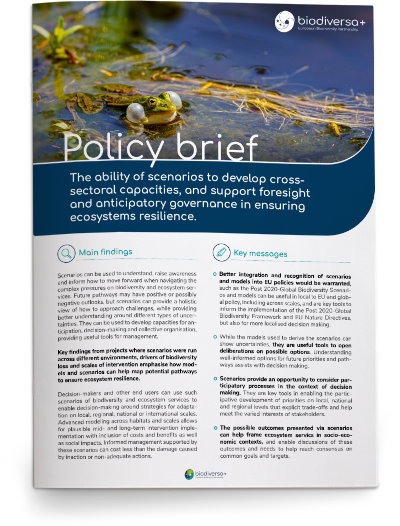Policy brief: “The ability of scenarios to develop crosssectoral capacities, and support foresight and anticipatory governance in ensuring ecosystems resilience”
Growing ecological pressures and uncertainty require approaches beyond traditional planning to ensure long-term resilience. Scenarios are not predictions, but powerful tools for navigating complex pressures on biodiversity and ecosystem services while strengthening anticipatory governance. Drawing on research from AlienScenarios, BioDiv-Support, InvasiBES, LimnoScenES, and Wild Health, this brief highlights how scenarios enable exploration of plausible futures and trade-offs, fostering understanding, awareness, and cross-sectoral collaboration to co-design locally relevant, cost-effective interventions.
Key takeaways include:
- Enhancing preparedness by helping decision-makers understand potential risks, trade-offs, and opportunities.
- Increasing relevance and capacity through participatory scenario co-creation that reflects real-world concerns and enables cross-sectoral collaboration.
- Supporting resilience with adaptive, future-oriented biodiversity policies.
- Committing to sustained investment as building impactful scenario capacities requires ongoing effort for effective policy integration.
Specific recommendations include:
- Applying scenarios at multiple scales, from local to international, to guide biodiversity and ecosystem service strategies.
- Using advanced scenario-based modelling across habitats and scales to support mid- and long-term planning considering costs, benefits, and social impacts.
- Supporting cost-effective management by informing decisions with scenarios to avoid inaction or poorly targeted measures.
- Integrating scenario approaches more fully into EU policy frameworks, including the Kunming-Montreal Global Biodiversity Framework and EU Nature Directives.




